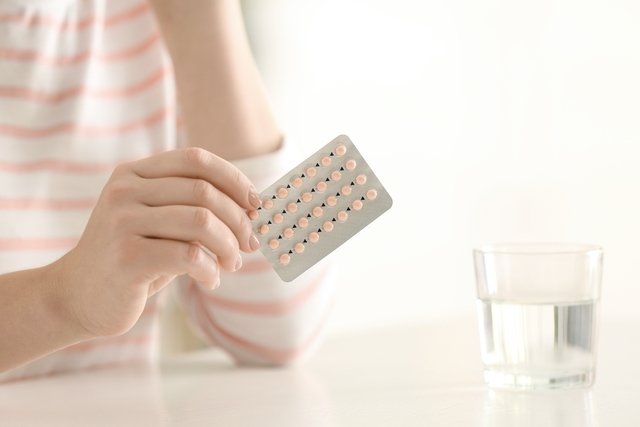Some medications, such as antibiotics or anticonvulsants, can cut or reduce the effect of the contraceptive pill, injection, implant, patch or vaginal ring, as they can interfere with the metabolism of hormones or reduce their absorption, changing the amount of hormones in the bloodstream and increasing the risk of unwanted pregnancy.
Furthermore, some medications can cause changes in the intestinal flora and lead to diarrhea, which can interfere with the absorption of hormones from the contraceptive pill, reducing its effectiveness. See other situations that can reduce the effect of contraceptives.
Therefore, the use of medication with contraceptives should always be guided by a gynecologist, who may recommend the use of an extra contraceptive, such as a condom, in order to prevent pregnancy.

Main remedies
Some medications that can cut or reduce the effect of contraceptives are:
1. Antibiotics
Antibiotics such as rifampicin and rifabutin to treat tuberculosis, leprosy or bacterial meningitis can reduce the effect of the contraceptive pill, vaginal ring, patch or hormonal implant, and therefore the use of an extra contraceptive method in these cases, such as condoms. , or switching to another contraceptive method, such as a copper or hormonal IUD, should be discussed with the gynecologist in advance.
These two are the only antibiotics that have been proven to reduce the contraceptive action of the pill, by altering enzymes responsible for the metabolism of hormones present in contraceptives, reducing the amount of these hormones in the bloodstream and reducing their effectiveness. However, although controversial, other antibiotics can affect the effectiveness of the contraceptive pill, such as penicillins, tetracyclines, erythromycin or clarithromycin, for example. See other antibiotics that can interfere with contraceptives.
2. Anticonvulsants
Medicines used to reduce or eliminate seizures can also compromise the effectiveness of contraceptive pills, such as phenytoin, phenobarbital, carbamazepine, oxcarbamazepine, primidone, topiramate or felbamate.
If it is necessary to use anticonvulsants, you should talk to the doctor responsible for the treatment, who prescribed the anticonvulsants, as there are already medicines in this class that can be used safely with contraceptives, such as valproic acid, lamotrigine, tiagabine, levetiracetam or gabapentin, for example.
3. Natural remedies
Herbal medicines, popularly known as natural remedies, can also interfere with the effectiveness of the contraceptive pill. An example of a natural remedy that interferes with contraceptive activity is saw palmetto, which is a medicinal plant widely used to treat urinary problems and impotence. See other uses for saw palmetto.
St. John’s wort, or St. John’s wort, used for the natural treatment of depression, is also not recommended for consumption while using the pill, as it alters the hormonal concentration in the bloodstream, reducing its effectiveness. Furthermore, it is possible that this medicinal plant also interferes with the effect of the hormonal patch and the vaginal ring.
Therefore, if you are using any of these medications, even if they are natural, you should consult your gynecologist, continue taking the pill normally, but use a barrier condom, such as a condom, in all sexual relations.
4. Antifungals
Griseofulvin, an antifungal indicated for the treatment of skin or nail mycoses, for example, can interfere with the hormone levels in contraceptive pills and reduce their effectiveness in preventing pregnancy.
Furthermore, other antifungals used to treat mycoses, whether oral or topical, such as ketoconazole, itraconazole, voriconazole or clotrimazole, are not indicated for women who use contraceptive pills, so if it is necessary to use an antifungal, it should be communicate to the gynecologist before starting treatment.
5. Antiretrovirals
Antiretroviral medications used to treat HIV and AIDS, such as lamivudine, tenofovir, efavirenz and zidovudine, can reduce the effectiveness of oral contraceptives.
Therefore, if the person is being treated with any of these medications, the use of the contraceptive pill is not recommended, and condoms should be used as one of the possible methods of contraception.
6. Other remedies
Other medications that can also affect the effectiveness of contraceptives are:
- Theophylline;
- Melatonin;
- Cyclosporine;
- Midazolam;
- Tizanidina;
- Etoricoxibe;
- Verapamil;
- Warfarin;
- Diltiazem.
For women who use the contraceptive pill, but who need to be treated with other medications, they must first contact the doctor responsible for the treatment, so that another medication can be indicated or another contraceptive method option can be considered. Discover other contraceptive methods besides the pill.

Sign up for our newsletter and stay up to date with exclusive news
that can transform your routine!
Warning: Undefined array key "title" in /home/storelat/public_html/wp-content/plugins/link-whisper-premium/templates/frontend/related-posts.php on line 12
Warning: Undefined array key "title_tag" in /home/storelat/public_html/wp-content/plugins/link-whisper-premium/templates/frontend/related-posts.php on line 13



